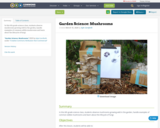
In this 6th grade science class, students observe mushrooms growing wild in the garden, handle examples of common edible mushrooms and learn about the lifecycle of fungi.
- Material Type:
- Activity/Lab
- Date Added:
- 02/12/2014

In this 6th grade science class, students observe mushrooms growing wild in the garden, handle examples of common edible mushrooms and learn about the lifecycle of fungi.
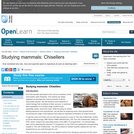
Ever wondered why rats, mice and squirrels seem to reproduce at such an alarming rate? Rodents are among the most successful of all the mammal groups. In this unit you will learn more about some of the evolutionary features that make these creatures so pl
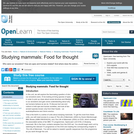
Who were our ancestors? How are apes and humans related? And where does the extinct Homo erectus fit into the puzzle? In this unit we will examine culture, tool use and social structure in both apes and humans to gain an understanding of where we come fro
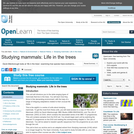
David Attenborough looks at ͢__ëńlife in the trees͢__ë_ ˘: examining how species have evolved to cope with arboreal living. You will learn how lemurs, anteaters, bears and many others have developed different methods to help movement and survival.
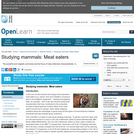
The powerful and majestic carnivores are the focus of many television documentaries. In this unit we will delve into the lives of these fearsome hunters and explore their physical adaptations and social behaviour. This is the fifth unit in the ͢__ëńStudying
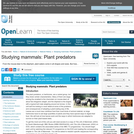
From the mouse-deer to the elephant, plant eaters come in all shapes and sizes. But how do they manage to flourish on a salad diet? In this unit we will examine the special features that allow them to extract their nutrients from leaves, and see how some
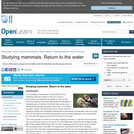
Some of the most unusual and versatile of all the mammals are the groups that live, feed and reproduce underwater. In this unit we will see how these formerly land-based mammals adapted to a return to the water, discussing such challenges as breathing, mo
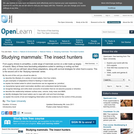
From pygmy shrews to armadillos, a wide range of mammals survive on a diet made up largely of insects. Many of these have fascinating adaptations suited to catching or rooting out their prey. In this unit you will learn about these adaptations, along with
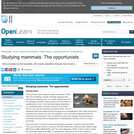
Many mammals are food specialists, with complex adaptations that gear them toward a particular food source. So how do the omnivores survive and prosper without these fancy evolutionary features? This unit examines the physiology, diet and strategies of so
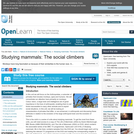
Monkeys have long fascinated us because of their similarities to the human race. In this unit you will find out about some of the characteristics that make them so like us: their physiology, complex social interactions, large brains and intelligence. This